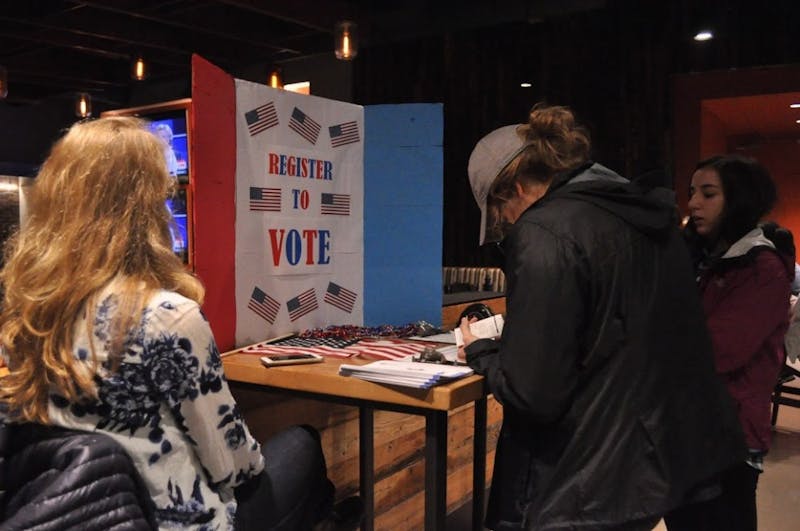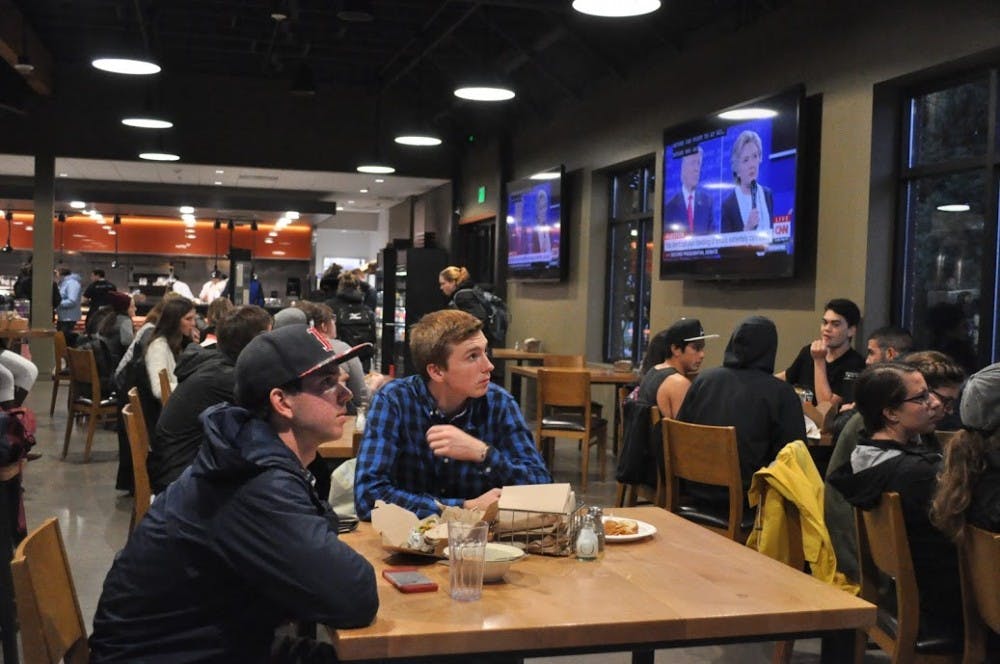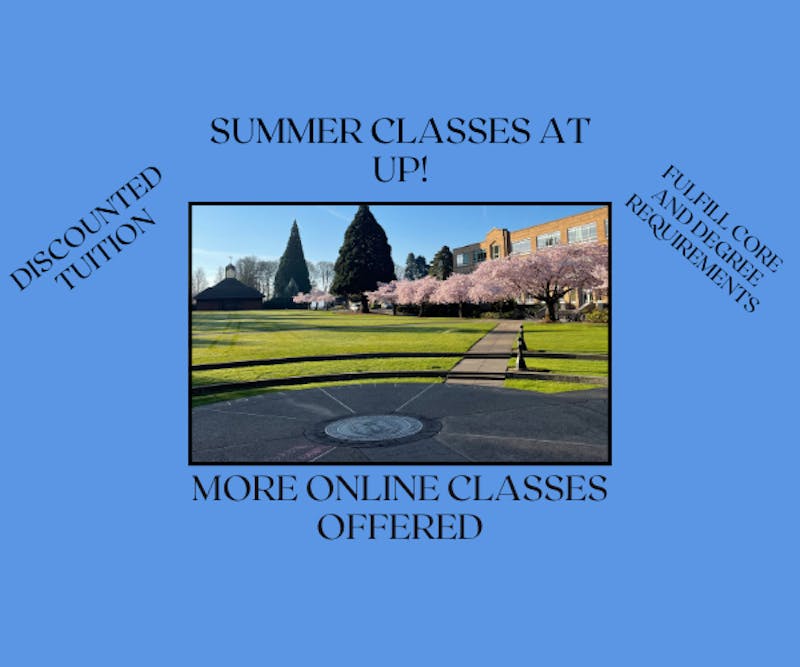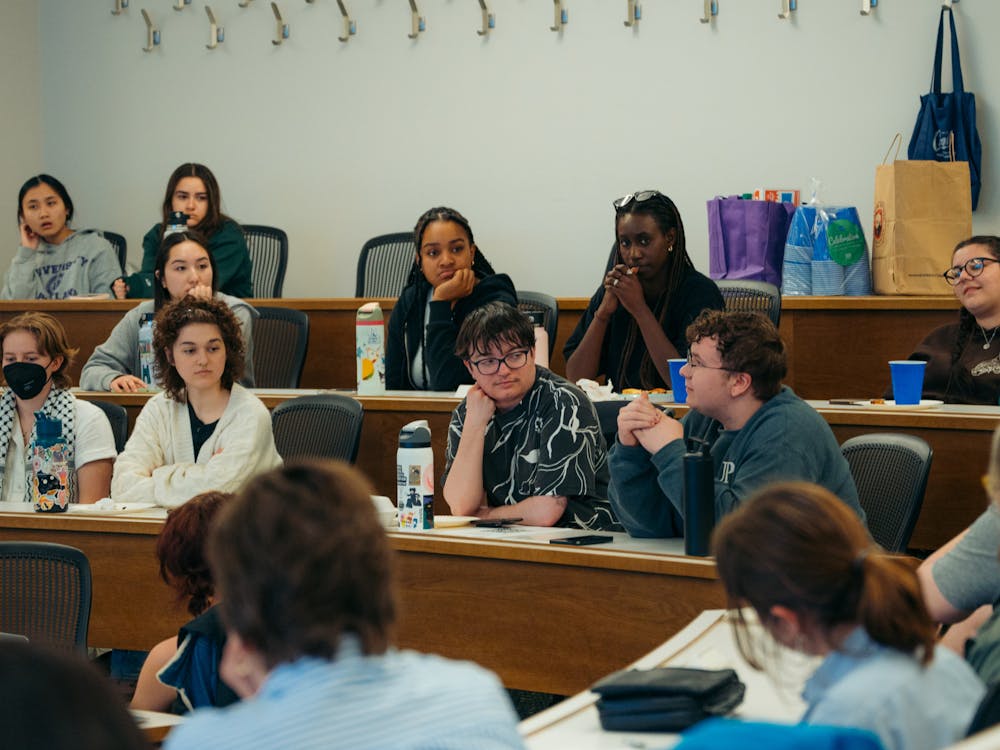A small crowd of University of Portland students turned out to the Pilot House for the airing of the presidential debate Sunday night. While the first debate on Sept. 26 drew a crowd of nearly 200 with many people standing, numerous seats were left unoccupied for its sequel. Most students had laptops out doing homework as they watched Democratic nominee Hillary Clinton and GOP nominee Donald Trump square off for the second time.
The 90-minute debate was moderated by CNN’s Anderson Cooper and ABC’s Martha Raddatz at Washington University in St. Louis, Missouri. The debate was in a “town hall-style” format, where undecided voters were hand-selected to be on the stage and ask the candidates their own questions. Questions from social media and online that were pre-approved by CNN and ABC were also asked by the moderators. The topics spanned a wide variety of interest areas such as the candidates’ rhetoric, healthcare, taxes, Islamophobia and Syria.
But many of the students watching felt questions from the citizens, a main focus of the town hall format, weren’t properly addressed by the candidates. They also believed important topics were left out of the questioning, including issues such as education and the North Dakota Pipeline.
“I don’t understand why we can skip over these humanitarian issues that are present in this country and then jump right into what we’ve talked about the last six months,” senior Emily Jones said.The theatrical tone of the debate was set from its onset, when Trump and Clinton didn’t shake hands at the start, a political tradition.

The event opened up with a question from one of the undecided voters, who asked the candidates if they believe they’re modeling appropriate behavior for today’s youth. The focus quickly drifted to the 2005 audio recording of Trump that surfaced Friday in which he made lewd comments towards women, describing in vulgar terms trying to have sex with women whether they expressly wanted to or not.
Cooper emphasized that Trump’s comments in the audio are reflective of sexual assault and suggested that he had taken advantage of women, punctuating the end of his question with, “Do you understand that?”
“I don’t think you understand what (the audio) was,” Trump said. He repeatedly stated, “It was locker room talk.”
Trump also took the opportunity to dig at Clinton’s husband, former president Bill Clinton, by referencing the several accusations of sexual misconduct against Bill Clinton.
In the middle of the debate, the student crowd erupted in laughter and chatter when the Democratic Nominee declared that it’s important that “a person of Trump’s temperament … is not in charge of law in our country” and Trump snarkily retorted, “Because you’d be in jail” — a threat that many took to Twitter to express their concerns about.
New - Harvard Law Prof @tribelaw:
— Ari Melber (@AriMelber) October 10, 2016
Trump's pledge to investigate & jail Clinton is an abuse of power that would be "impeachable offense."
Social media discussion during the debate also centered on Trump’s call to Muslim-Americans to “report what they see” to help avoid terrorist attacks in the U.S., referencing San Bernadino and even 9/11. This comment prompted the highly popular hashtag #MuslimsReportStuff and this Tweet, which became the most retweeted thing of the debate:
I'm a Muslim, and I would like to report a crazy man threatening a woman on a stage in Missouri. #debate
— Moustafa Bayoumi (@BayoumiMoustafa) October 10, 2016
Junior Mohammed Bakhsh, a muslim student, said he was upset by the way Trump addressed a voter concern about growing Islamophobia in the debate. Bakhsh was frustrated that the GOP nominee called for fighting ISIS and “radical Islam” aggressively, while brushing over concerns of Muslim-Americans and his call for a ban on muslims in the past.
He believes that he may be deported from the U.S or his family wouldn’t be able to come to visit him in the states in the case of a Trump presidency.
“The election is more of a sealing my own fate now,” Bakhsh said.
Taking a new tone at the end of the debate, one of the undecided voters asked: “Regardless of the current rhetoric, would either of you name one positive thing that you admire in the other?”
After laughter and smiles from both candidates and the St. Louis audience, Clinton responded by referring to Trump’s kids and acknowledged them as being “incredibly able and devoted” and that it “says a lot about Donald.” Trump’s positive reception of the remarks was a source of comic relief for many students, drawing numerous ‘Aww’s from the Pilot House crowd. Trump also went on to say that he admired Clinton’s fighting spirit, even as he disagrees about much of what she fights for.
Senior Scott Hearron felt that the leaked audio addressed at the beginning of the debate shows Trumps true colors, but thought Clinton didn’t take full advantage of the opportunity to gain the upper hand.
“I wish (Clinton) would have brought up, ‘Your own running mate can’t support what you’ve done.’ How do you explain that?” Hearron said, referencing a moment during the debate when Trump disagreed with running mate Mike Pence on working with Russia, saying “he and I haven’t spoken.”
Hearron also said he thought the debate moderation was biased and that the moderators took bigger jabs at Trump than Clinton did.
Several times, Trump called out the moderators for interrupting him more often than Clinton, though Politico reports Trump got nearly a minute more speaking time during the debate than Clinton, and he interrupted her 13 times while she spoke over him only once.
Vote UP will host another watch party in the Pilot Hosue for the third and final presidential debate on Oct. 19.









